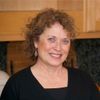We Are What We Eat: Jubilee Conference Association of Jewish Librarians
About one month ago I spoke at the Jubilee Conference of the Association of Jewish Librarians in Washington DC. It has taken me this long to reflect upon and assimilate the experience and to realize how truly amazing it was. And when it was over I realized the aphorism “You Are What You Eat” had taken on an entirely new depth and dimension.
The atmosphere was downright exhilarating! It was imbued with the quest for new knowledge and also by the warm friendships formed by those who have been connected through the years in this association. These dedicated members are always finding new ways to educate and to inspire others through books and learning.
I spoke on a panel with Joan Nathan and Beyhan Cagri Trock. We were all part of a workshop aimed at researching Jewish roots through foods.
Joan Nathan is an award-winning American cookbook author and journalist who has written ten cookbooks and produced TV documentaries. Beyhan Trock is the author of The Ottoman Turk and the Pretty Jewish Girl, a Turkish and Sephardic Cookbook. My cookbook, of course, is Food Family and Tradition, and between the three of us, we represented different geographical and historical perspectives on the roots of our culture through traditional food.
Joan introduced the workshop with her fascinating, encyclopedic knowledge of Jewish history and how the journeys of the Jewish people impacted on their foods, the culinary style, the spices, the specific dishes. I was mesmerized. Then I spoke, honing in on the history of Hungarian/Czechoslovakian Jews, more specifically in the early 1900s. I described how their foods were also defined by the produce that was indigenous to the region, and thus how the traditional holiday customs and foods developed. I spoke of the rich Jewish culture in Eastern Europe. Beyhan led us into a world of Turkish foods, drawing from the backgrounds of both her Jewish mother and her Muslim father. Her book is beautiful and the foods are downright mouthwatering.
“You are what you eat,” is a generally accepted phrase taken to mean that if you eat good (nutritious) food you will be healthy; however the phrase has an interesting history. In 1826 Brillat-Savarin, a French gourmet and philosopher, wrote “Tell me what you eat and I will tell you what you are.” And in 1863 the German philosopher Ludwig Andreas Feuerbach wrote, “Man is what he eats.” Both men, being philosophers, were not speaking literally, but pointing out that the food one eats has an effect on one’s state of mind and health. The phrase became really popular in 1942 when Victor Lindlahr, American nutritionist, published his You Are What You Eat diet cookbook, and in 1960s when health spokesperson Adele Davis championed organic food and used this slogan.
So after speaking at this conference and learning how very deeply the roots of culture and food intertwine in Jewish history, I can honestly say that my parents, in their generation, were what they ate, and I, in my generation, am also what they ate because I have continued their traditions and recipes.

